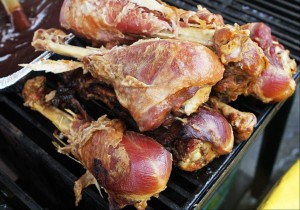More than 80 percent of the food vendors at last year’s Great Frederick Fair used unsafe food practices, according to inspections by the Frederick County Health Department.
 The department’s health inspectors recommended corrective actions for 56 of the 67 permitted vendors at the 2013 fair. The vendors’ offerings ranged from corn dogs and caramel apples to country ham sandwiches and Maryland crab soup.
The department’s health inspectors recommended corrective actions for 56 of the 67 permitted vendors at the 2013 fair. The vendors’ offerings ranged from corn dogs and caramel apples to country ham sandwiches and Maryland crab soup.
Inspectors often found food that was “out of temperature” — a vendor threw out hamburgers, hot dogs and sausage links voluntarily after the items were found to be at an unsafe temperature all afternoon.
But the most frequent violations were for the vendors’ kitchen setup: permits were not displayed, wash stations had no overhead protection and coolers and freezers were missing thermometers.
The county’s inspectors generally visit vendors as soon as they set up their tent or stand. On occasion, inspectors see violations after a vendor has started serving food.
“We don’t want to hold up or hinder the fair or the vendors by not allowing them to start because there are so many vendors and so few of us,” Food Control Program Manager Wendy Cochran said.
Cochran said they expect to issue between 70 and 80 food vendor permits for this year’s fair, slightly more than last year.
Investigating the potential benefits of on-site food safety training for Folklorama, a temporary food service event
06.oct.12
Journal of Food Protection®, Volume 75, Number 10, October 2012 , pp. 1829-1834(6)
Mancini, Roberto; Murray, Leigh; Chapman, Benjamin J.; Powell, Douglas A.
http://www.ingentaconnect.com/content/iafp/jfp/2012/00000075/00000010/art00014
Abstract:
Folklorama in Winnipeg, Manitoba, Canada, is a 14-day temporary food service event that explores the many different cultural realms of food, food preparation, and entertainment. In 2010, the Russian pavilion at Folklorama was implicated in a foodborne outbreak of Escherichia coli O157 that caused 37 illnesses and 18 hospitalizations. The ethnic nature and diversity of foods prepared within each pavilion presents a unique problem for food inspectors, as each culture prepares food in their own very unique way. The Manitoba Department of Health and Folklorama Board of Directors realized a need to implement a food safety information delivery program that would be more effective than a 2-h food safety course delivered via PowerPoint slides. The food operators and event coordinators of five randomly chosen pavilions selling potentially hazardous food were trained on-site, in their work environment, focusing on critical control points specific to their menu. A control group (five pavilions) did not receive on-site food safety training and were assessed concurrently. Public health inspections for all 10 pavilions were performed by Certified Public Health Inspectors employed with Manitoba Health. Critical infractions were assessed by means of standardized food protection inspection reports. The results suggest no statistically significant difference in food inspection scores between the trained and control groups. However, it was found that inspection report results increased for both the control and trained groups from the first inspection to the second, implying that public health inspections are necessary in correcting unsafe food safety practices. The results further show that in this case, the 2-h food safety course delivered via slides was sufficient to pass public health inspections. Further evaluations of alternative food safety training approaches are warranted.
 Farmpak, located at 68 Irishtown, was visited by environmental health officers, accompanied by Gardaí, on the afternoon of Thursday, October 23 and the premises was closed later that day on foot of a food safety investigation.
Farmpak, located at 68 Irishtown, was visited by environmental health officers, accompanied by Gardaí, on the afternoon of Thursday, October 23 and the premises was closed later that day on foot of a food safety investigation.








